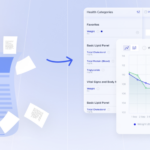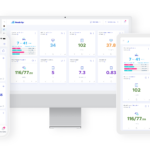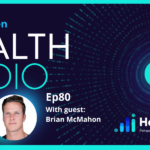
Ep. 59 – Integrative and Functional Nutrition with Dr. Sheila Dean from the IFNA
Podcast: Play in new window | Download
Subscribe: Apple Podcasts | RSS
Dr. Sheila Dean of the Integrative and Functional Nutrition Academy dives into how she started IFNA, what the academy’s courses teach, functional nutrition, becoming a VA vendor, and where conventional and integrative medicine differ. She covers all this and more with Heads Up founder Dave Korsunsky.
Heads Up
This podcast is brought to you by Heads Up, a web app designed to help both individuals and health practitioners centrally track the vital health data that matters. Instantly synchronize your (or your clients’) medical records, connect favorite health devices and apps, and use the data to optimize your health (and that of your clients).
Click on the start link below to start your free 30-day trial. Or, read on for more information about our latest podcast episode!
“It’s not just about Sheila Dean in private practice, but it’s about empowering and educating as many nutrition healthcare professionals as possible to get out there and to do this.” – Dr. Sheila Dean
Integrative and Functional Nutrition Academy
The Integrative and Functional Nutrition Academy (IFNA) is one of the most respected online functional nutrition training and mentoring programs in the industry. It was founded by two of the nation’s premier integrative medicine nutritionists, Dr. Dean and Kathie Swift MS.
Consisting of 5 tracks with 33 modules, the IFNA program teaches leading-edge, evidence-based, whole systems approaches to patient care. This emerging medical nutrition model focuses on identifying root causes and imbalances to significantly improve health outcomes and combines the very best of modern science, clinical wisdom, and critical thinking.
Dr. Sheila Dean
Dr. Sheila Dean, DSc, RDN, LDN, IFMCP is a registered and licensed dietitian nutritionist, board certified integrative and functional medicine certified practitioner, clinical nutritionist, and exercise physiologist. She was a Certified Diabetes Educator with the NCDBE for 15 years.
She received her undergraduate training through Rutgers University, completed her internship and graduate training with University of Rhode Island and Brown University’s teaching hospitals, received doctoral training in nutritional genomics and pharmacology through the University of Medicine and Dentistry of New Jersey (UMDNJ) and completed her Doctorate of Science degree through Hawthorn University.
Dr. Dean has received advanced training in functional medicine and nutritional biochemistry through the Institute for Functional Medicine and is a board certified IFM practitioner. She has also worked with the Duke University Medical Center’s Endocrinology and Metabolism Disorders Clinic and the Joslin Center for Diabetes as a certified diabetes educator.
She’s served as the consulting sports nutritionist for the Philadelphia Phillies, has consulted for the Tampa Bay Buccaneers, the Toronto Blue Jays and was the media spokesperson and columnist for the Ironman Institute and is the author of Nutrition & Endurance: Where Do I Begin? (Meyer & Meyer Publishing).
In this episode:
(2:13) Dr. Dean discusses her background being a dietician for 30 years. Around 2000, she became disillusioned with the field and was exposed to functional medicine. After her research, she concluded that this was a field she was excited to join.
(4:29) Dr. Dean started incorporating her functional medicine knowledge into her practice. The types of patients who went to see her began to expand.
(5:26) Dr. Dean and Kathie Swift were constantly being called and texted by people asking for training. IFNA launched in 2015.
(6:54) Dave reflects on Dr. Dean’s journey and how she created her functional nutrition business.
(8:04) Dr. Dean and Kathie felt that dieticians were pretty ignored. They wanted to create a program for dieticians.
(9:30) Dr. Dean dives into her functional nutrition program and what people will learn from it. IFNA teaches people a specialized area. There are 33 modules and it takes about a year to finish. There are nine components. Track 1 covers everything from food is medicine, conventional labs, functional blood chemistry interpretation, dietary supplements, the science, and the art. Track 2 gets into all the different systems areas. Track 3 is about the application and building your own private practice. There is a track dedicated to therapeutic elimination diets. The final track, Track 5, is dedicated to case studies.
(15:35) Dr. Dean says the ideal scenario for her students is for them to setup an integrative-based practice. IFNA are VA vendors, so they have a contract with the government that pays for the all the programs that their VA dieticians go through.
(17:59) Dr. Dean believes that asking questions about root cause analysis is the foundation of trying to understand how to restore health and function.
(19:20) Dave narrows in on the issues with the standard American diet and lack of education for children.
(21:01) Dr. Dean and Kathie are focused on empowering as many functional nutrition healthcare professionals as possible. Heads Up Health’s mission is to give certified professionals the remote ability to measure and analyze how patients are doing.
(25:19) Conventional and integrative communities agree that autoimmunity is a condition where the immune system is hyper vigilant and maybe attacking its own tissue. The difference in the communities lies in the way the issue is handled. Once the patient is stabilizied, Dr. Dean thinks the physician should figure out or outsource the patient to somebody who will figure out the underlying issue.
(29:39) Dr. Dean cautions practitioners not to replace a drug with a supplement.
(31:51) If you take a personalized approach, there isn’t one or two panels that you need take. But, a really good overall panel is a nutra eval. It looks at many different biomarkers related to nutritional status.
(34:05) STAIN is an acronym used by IFNA. Stress, Toxins, Adverse food reaction, Infection, and Nutritional deficiency. Dr. Dean gives examples for each type.
(37:52) Dave shares how he discovered an infection in his microbiome that showed up in a test once he started working with a functional doctor.
(40:06) Medications can cause nutritional deficiencies. Magnesium and CoQ10 can typically be depleted by medications.
(43:48) Dr. Dean says it is key for functional nutrition practitioners to track data and stay organized.
References
Stay Up To Date With The Latest News In Digital Health
























